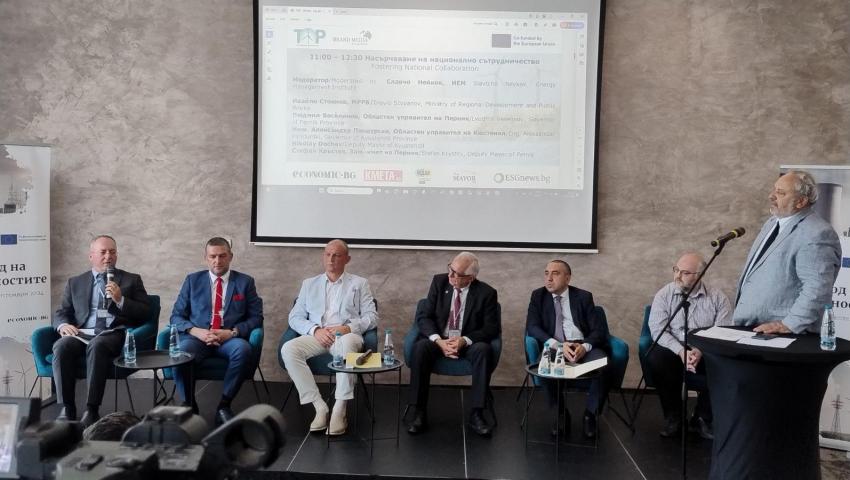The state should make more efforts to support RES investors in our country
Projects for thousands of megawatts of green energy face administrative problems, but can be quickly connected to the grid

The state should make more efforts to support investors in renewable energy in our country, and one of the options is to ease the administrative procedures for such projects. This approach is key in order to fulfill the goals of decarbonization and green transition that our country has set for itself. This became clear from the speeches of experts during the international forum "Possibilities for a just transition beyond the borders", which was held today in Sofia and was dedicated to the economic transformation of the coal regions.
The topic was extensively commented on by the energy expert Slavcho Neikov, who gave several examples in which the state can intervene, and not just talk about European funds and expected funding. Outside of European funding, there are also business ventures that want to invest funds to support this transition to clean energy. An example in this regard is the construction of a solar park near the village of Apriltsi, where investors encounter administrative obstacles. We are talking about thousands of megawatts of RES capacity that have problems but can be connected to the energy system. That is, the business encounters specific problems and they are not to be underestimated at all, it became clear from his words.
In fact, quite often in our country wind and solar energy are used in front of the public and presented in black colors, from which certain individuals derive political dividends. Such fear-mongering among local communities is often unfounded and against the decarbonisation policy of the European Union. It is here that the role of the state is to dispel any doubts and concerns among the local population regarding the dangers of building RES plants and to show the public what the benefits are for people. In fact, Europe is not only talking, but also acting in this direction - in a number of countries there are a huge number of energy communities that rely precisely on local RES production in order to be energy independent. At the moment, there is no reliable data from scientists and specialists that wind projects, for example, can interfere with agriculture or the bird population. Even investors in wind farms along the Bulgarian coast install special systems to protect migratory birds. There are similar concerns about solar parks, which are already successfully combined with agricultural production - this is how agrovoltaic systems are created, again at the local level.
Bulgaria needs to utilize its local wind resource and supplement production from solar parks to have a balanced energy mix, which will be joined by energy storage systems in the future. Wind turbines have been operating safely for over 15 years in several different projects in our country without damaging the environment. And our country is obliged to adhere to the European policy for promoting the development of renewable energy projects.
All these arguments were supported during today's conference, and it is clear to everyone that coal power is reducing its presence in the energy mix. The market itself will slowly push out coal plants, which are becoming less and less competitive because of their high prices.
It is important that politicians and statesmen do their part to make the transition fair for all people. The European Commission is ready to finance various projects in this direction, it became clear during the conference.
The state will conduct an eco-assessment of the "Energy and Climate" plan
One such project by which Bulgaria hopes to transform its economy is the integrated national energy and climate plan. Its goals are ambitious, but also achievable, Deputy Energy Minister Krasimir Nenov explained during the forum. The plan is now awaiting approval by the Council of Ministers, but it will also need to be environmentally assessed. It will be carried out by the Ministry of Environment and Water, which is also involved in the preparation of the plan. The plan itself must be quickly submitted for consideration to the European Commission so that Bulgaria can benefit from the financial assistance. Subsequently, the plan itself will serve as the basis for the creation of the new energy strategy of our country.
In addition to the "Climate Energy" plan, our country can also count on financial support under the cohesion policy of the European Union, the Just Transition Fund and the European Recovery Plan to ensure a smooth and fair transition to a climate-neutral economy.
According to Nenov, there has already been significant progress on the renegotiation of the Recovery and Resilience Plan. "There is an understanding on the part of the European Commission (EC). There is a project proposal that is favorable for Bulgaria and acceptable to the EC in terms of decarbonisation and for the reform in terms of the management of state-owned companies", he pointed out. It is about the separation of the transmission operators ESO and Bulgartransgaz into a new state company, different from BEH.
A new company is also planned to be responsible for the reclamation of the old coal fields. The experience of Greece, which has two such companies already operating in the country, will be considered here. The new company is planned to have a budget of nearly 250 million euros for recultivation and improvement of the living environment of the regions.
Important negotiations are also underway on the RePowerEU program, which will provide funds for the renovation of public buildings as well as residential blocks. The negotiations there are expected to end by the end of the year, explained the deputy minister. This project also provides funding for the digitization and transformation of the electricity transmission and distribution networks.
Further negotiations with the EC must be held quickly to approve the changes. This will allow, in the remaining short period until August 2026, to carry out investments that are important for the Bulgarian economy.
